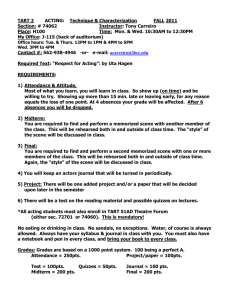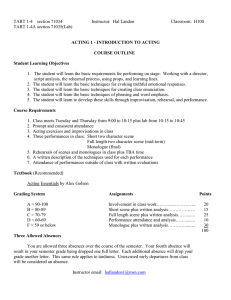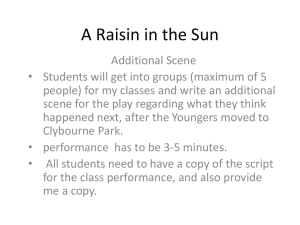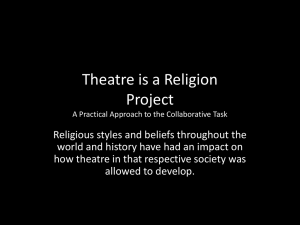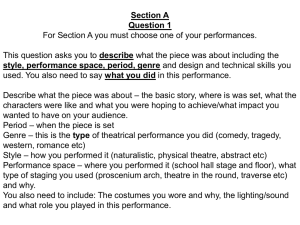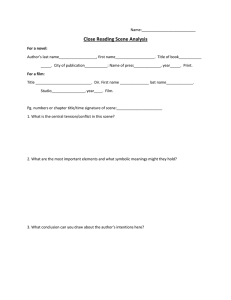TART 3 4
advertisement
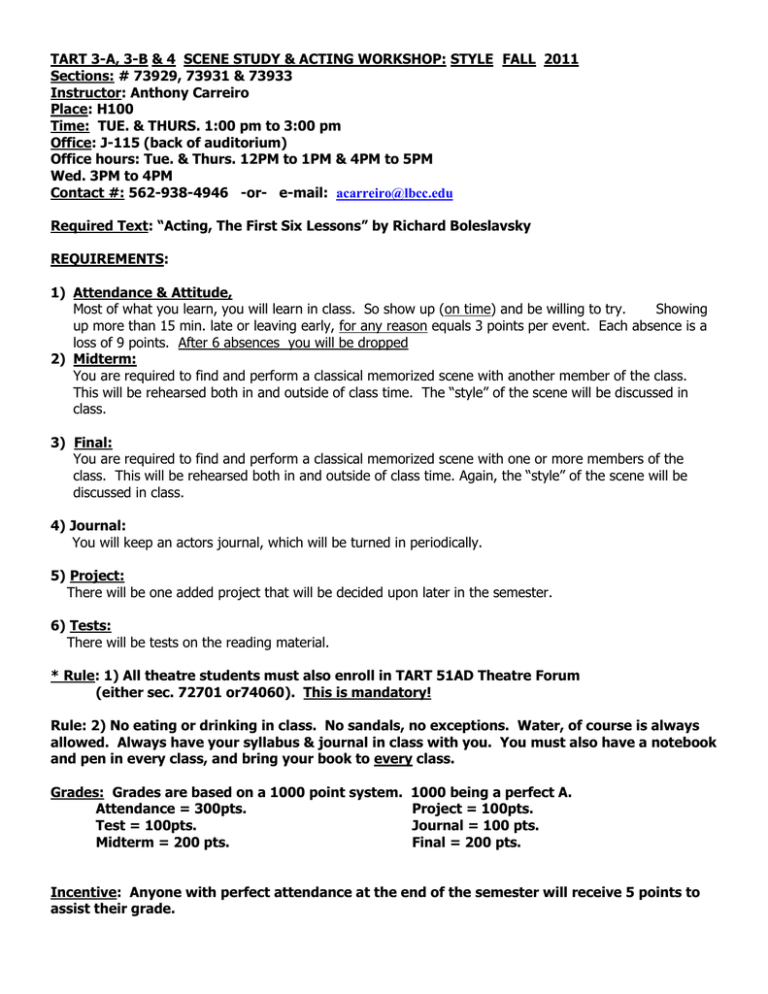
TART 3-A, 3-B & 4 SCENE STUDY & ACTING WORKSHOP: STYLE FALL 2011 Sections: # 73929, 73931 & 73933 Instructor: Anthony Carreiro Place: H100 Time: TUE. & THURS. 1:00 pm to 3:00 pm Office: J-115 (back of auditorium) Office hours: Tue. & Thurs. 12PM to 1PM & 4PM to 5PM Wed. 3PM to 4PM Contact #: 562-938-4946 -or- e-mail: acarreiro@lbcc.edu Required Text: “Acting, The First Six Lessons” by Richard Boleslavsky REQUIREMENTS: 1) Attendance & Attitude, Most of what you learn, you will learn in class. So show up (on time) and be willing to try. Showing up more than 15 min. late or leaving early, for any reason equals 3 points per event. Each absence is a loss of 9 points. After 6 absences you will be dropped 2) Midterm: You are required to find and perform a classical memorized scene with another member of the class. This will be rehearsed both in and outside of class time. The “style” of the scene will be discussed in class. 3) Final: You are required to find and perform a classical memorized scene with one or more members of the class. This will be rehearsed both in and outside of class time. Again, the “style” of the scene will be discussed in class. 4) Journal: You will keep an actors journal, which will be turned in periodically. 5) Project: There will be one added project that will be decided upon later in the semester. 6) Tests: There will be tests on the reading material. * Rule: 1) All theatre students must also enroll in TART 51AD Theatre Forum (either sec. 72701 or74060). This is mandatory! Rule: 2) No eating or drinking in class. No sandals, no exceptions. Water, of course is always allowed. Always have your syllabus & journal in class with you. You must also have a notebook and pen in every class, and bring your book to every class. Grades: Grades are based on a 1000 point system. Attendance = 300pts. Test = 100pts. Midterm = 200 pts. 1000 being a perfect A. Project = 100pts. Journal = 100 pts. Final = 200 pts. Incentive: Anyone with perfect attendance at the end of the semester will receive 5 points to assist their grade. Academic Honesty: (This statement is taken directly from the LBCC Faculty Guide) “Lack of honesty in the classroom is considered a very serious offense. Any form of cheating on tests, turning in of work which is not one’s own (plagiarism), talking during tests, furnishing false information to instructors or knowingly misrepresenting one-self to the college is grounds for disciplinary action. The consequences of cheating are severe and may include the possibility of expulsion. Disciplinary action can include the following: warnings, reprimands, probation, suspensions, expulsion, restitution, and loss of financial aid.” Overview of TART 3/4 Focus: This class will be an in-depth investigation into acting in different theatrical periods. Since this is an advanced course, we will be dealing with the techniques of period text analysis and theatre styles. We will be working with different classic ‘styles” of acting in our scene work. Come prepared to work hard and have fun. Weeks One to Four: Review of “Objectives”, “Obstacles” and “Actions”. Theatre games. Developing improved text analysis skills and choosing scenes. Weeks Five to Eight: First scene. Character choices based on text; based on circumstances; based on supported imagination. Poetry and meter. Elizabethan language. New words. Weeks Nine to Twelve: Second scene. Working off your partner. Historical research, Costume and period props. Weeks Thirteen to Seventeen: The final steps. Final rehearsals; technical rehearsals; putting it all together: props, costumes and set design. Previews and performances. Learning to keep it fresh. Learning effective warm-up techniques. Student Learning Outcomes for TART 3/4: 1. Investigate character development and text analysis at an advanced level. 2. Synthesize advanced techniques of stage acting. 3. Examine performance styles of Elizabethan and Restoration plays. Learning Objectives for TART 3/4: 1) 2) 3) 4) 5) 6) 7) Demonstrate performance techniques at an advanced level. Analyze theatre text at a deeper level with focus on Elizabethan and Restoration styles. Define and utilize beginning verse techniques. Appraise at a beginning level uses for verse and prose styles of theatre writing. Justify character choices through text analysis. Defend character choices with historical data. Evaluate major playwrights from the Elizabethan period and their contributions to theatre. 8) Appraise character motivation and role analysis of Elizabethan and Restoration plays.
